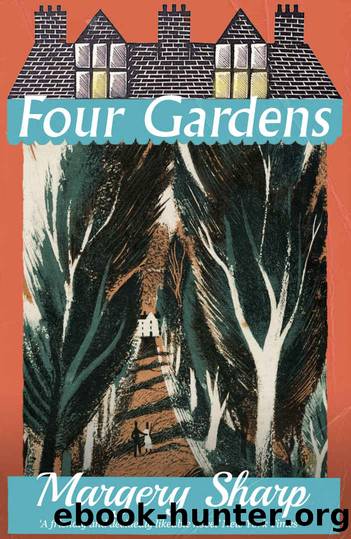Four Gardens by Margery Sharp

Author:Margery Sharp [Sharp, Margery]
Language: eng
Format: azw3
Publisher: Dean Street Press
Published: 2021-01-04T00:00:00+00:00
II
The society of Friarâs Green was not large. It comprised a doctor, a parson, a middle-aged landscape-painter R.A., and two maiden ladies who bred Golden Labradors, all of whom Caroline saw in church the first Sunday morning. Their aspect was reassuring; they looked just like people in Morton. Also as in Morton, there was a working party at the Vicarage, where Caroline was soon spending three afternoons a week and paying the usual fourpence for her tea. Here indeed the air blew at first a little coldly; she was awareânot of antagonismâbut of a critical, still charitably suspended judgment which was nevertheless predisposed to come down heavily on the wrong side. She was the New Rich. She was the wealthy Mrs. Smithâhow extraordinary it seemed to her!âwho had stepped into Mrs. Cornwallisâs shoes. That she wore them at all was a misdemeanor; if she trod in them too proudlyâor if with an affected humilityâon would go the black cap. All this Caroline felt as the Vicarâs wife first came forward to greet her: she saw the Labrador spinsters politely aloof, the Doctorâs wife faintly smiling, at the other end of the table women from the cottages looking curiously over their work. Caroline smiled, sat, and accepted wool for a pair of bedsocks. When the talk turned on the inefficiency of the old sewing-machine she resisted the impulse to offer a new one; as she had previously resisted impulses to buy a Golden Labrador from the Misses Brodrick and a landscape from the R.A. But she promised flowers for the church, and offered the use of her garden and boat-house to such Boy Scouts as wished to practice life-saving. By the end of the afternoon the Vicarâs wife at least had lost her constraint. She promised to call the next day; and though this in a sense was unnecessary, Caroline did not dissuade her. There was a good deal she wanted to say and the Vicarâs wife seemed the right person to say it to.
âFirst of all,â began Carolineâshe had been rehearsing the speech all dayââI want you to let me know all that Mrs. Cornwallis did for the village and in the church, and how much of it I can do instead. Itâs notââin spite of herself she flushed a littleââitâs not that I want toâto take her place; but I donât want Friarâs Green to lose by our coming. I could see at the working partyââ
âOh, no!â cried the Vicarâs wife rashly.
âNot you,â said Caroline, âbut itâs only natural. So I want you to tell me things.â
The Vicarâs wife looked slightly embarrassed.
âAs far as Mrs. Cornwallis is concernedâshe had a pew of courseââ
(âIâm Chapel, really,â put in Caroline frankly.)
ââbut, apart from that I donât think she did anything at all.â
The statement seemed to take them both by surpriseâCaroline because she had expected something so different, the Vicarâs wife because she had never before put it into words.
âWell!â said Caroline.
âShe once lent the gardens for a treat, but the children broke a rose-bush.
Download
This site does not store any files on its server. We only index and link to content provided by other sites. Please contact the content providers to delete copyright contents if any and email us, we'll remove relevant links or contents immediately.
Fresh from the Country by Miss Read & Brian Flynn(429)
If Only It Were True by Marc Levy(416)
Complete Works of Winston Churchill by Winston Churchill(258)
The Road of Bones to the Arctic Gulag by Anthony Vincent Bruno(233)
A House Full of Men by Parinda Joshi(211)
Chronicles of Sherlock Holmes by David B. Beckwith(201)
How to Draw Manga. Vol. V. Drawing Female Characters by Unknown(196)
John Dough And The Cherub (1906) (L. Frank Baum) by Unknown(193)
All-Time Best Recipes: From the first 100 issues of America's most reliable food magazine by The Editors of Cook's Illustrated Magazine(193)
Beethoven's Assassins by Andrew Crumey;(191)
0ffbef875ab23ff252e71f7c48b9c417 by Franz Kafka & Kafka Franz(191)
Hawthorne, Nathaniel Hawthorne by The house of seven gables(183)
The Reincarnationist Papers by Eric Maikranz(174)
The Four Seasons Collection by Milly Johnson(167)
The Fair Maid of Perth by Sir Walter Scott (Illustrated) by Sir Walter Scott(166)
The Ghosts of Meenambakkam by Ashokamitran(164)
Tuesday Evenings with the Copeton Craft Resistance by Kate Solly(160)
To the Very Last Inch by Heidi Belleau(155)
Kidnapped by Henry Brook(150)
